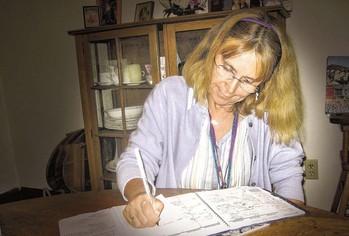Alzheimer’s is a slick disease.
In its earliest stages, it looks just like normal aging. Many older people find themselves groping for words, forgetting names and fumbling up appointment times.
But for an estimated 5.4 million Americans — and about 4,400 in Chemung, Steuben and Schuyler counties — forgetfulness and other symptoms grow relentlessly worse because they are afflicted with Alzheimer’s Disease, or AD.
The most common type of dementia, AD wraps its tentacles around memories and yanks them away, steals words, strangles the personality and wrings the patient into being someone unfamiliar.
And that’s not all. It also packs a deadly punch. It’s the sixth-leading cause of death in the U.S., and the only one in the top 10 that can’t be prevented, cured or even slowed down very much.
The Elmira Walk to End Alzheimer’s will take place on Saturday in Eldridge Park. Judy Ann Abel, of Lawrenceville, will lead a team from her town’s Calvary United Methodist Church. Many in the members’ families — and their church family — have been touched by AD and other forms of dementia or associated illnesses.
So has the Waverly Presbyterian Church.
The Rev. Cynthia Huling Hummel, of Elmira, has Amnesiac Mild Cognitive Impairment, a progressive, degenerative brain disorder that can be a precursor to full-blown dementia.
She believes it started when she was in her 40s. She was on the verge of getting her Ph.D., but was experiencing more and more trouble retaining the information she had read. She struggled and achieved her doctorate and just added a third book to the two already bearing her name as their author.
Cynthia, 58,was pastor of the Waverly Presbyterian Church. Early last year, she announced in a poignant note that she had to give up the position she loved.
She no longer recognized the parishioners she had served for years, and could barely recollect the confidences they had shared with her.
Her vast support system hovers close, but she’s as independent as ever, having developed tricks to offset her faltering memory. She’s a list maker, and sends herself text messages and voicemails.
Friends make sure fresh produce is plentiful and always available, so she can treat herself to the best possible diet. She swims three times a week and audits classes at nearby Elmira College.
Before she leaves the house, she buzzes through a printed checklist. Coffee maker turned off? Front door locked? She can still drive safely, and keeps all her keys — and her identification —on a chain around her neck.
Cynthia participates in the Alzheimer’s Disease Neuroimaging Initiative, one of the largest studies of AD in the country, through the University of Rochester Medical Center, said Lydia Fernandez of the Rochester & Finger Lakes Chapter of the Alzheimer’s Association.
She’s not going down without a fight. Cynthia is also writing her fourth book, which will include portions of her current medical journey.
Its working title is, “What Now, God?”

